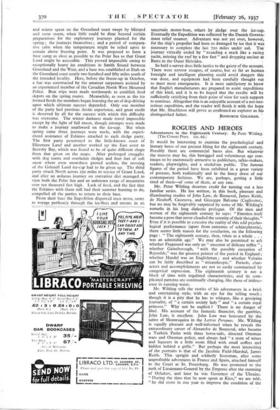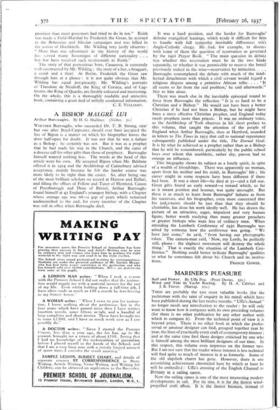ROGUES AND HEROES
IT would be interesting to examine the psychological and literary bases of our present liking for the eighteenth century. Possibly there are commercial bases also. But whatever the reasons may be, this bewigged and voluminous age con- tinues to be enormously attractive to publishers, talkie-makers, readers, playwrights, and a credulous public. The famous figures of the period have been exhibited in a great variety of posture, both realistically and in the fancy dress of our contemporary fashions. We are, perhaps, getting a little tired of them—of some of them, at any rate.
Mr. Peter Wilding deserves credit for turning out a less familiar series. He has written, in this book, pleasant and illuminating studies of John Law, de Bonneval, James Keith, de Neuhoff, Casanova, and Giuseppe Balsamo (Cagliostro), but we may be forgivably surprised by some of Mr. Wilding's- remarks in his long dialectic prologue. Of the men and women of the eighteenth century he says : "Emotion itself became a pose that never clouded the serenity of their thoughts." Even if it is possible to conceive the reality of this odd psycho- logical performance (apart from extremes of schizophrenia), there seems little reason for the conclusion, on the following page : " The eighteenth century, then, taken as a whole . . . was an admirable age." We may also be permitted to ask whether Fragonard was only an " executor of delicate trifles " ; whether Gainsborough, " with the possible exception of Reynolds," was the greatest painter of the period in England ; whether Handel was an Englishman ; and whether Voltaire can be fairly described as " misanthropic." Periods, char- acters and accomplishments are not so easily summarised by categorical expression. The eighteenth century is not a block of time with regulated characteristics, and its com- plicated patterns are continually changing, like those of iridesc- ence in running water.
Mr. Wilding tells the stories of his adventurers in a brisk and entertaining style, with an eye for the telling touch ; though it is a pity that he has to whisper, like. a gossiping journalist, of " a certain society lady " and " a certain royal princess." Why not be explicit ? There is no danger of libel. His account of the fantastic financier, the gambler, John Law, is excellent. John Law was honoured by the satire of Montesquieu in the Lettres Persanes. Mr. Wilding is equally pleasant and well-informed when he reveals the extraordinary career of Alexandre de Bonneval, who became a Turkish Pasha with three horse-tails, directed Ottoman wars and Ottoman policy, and always had " a store of wines and liqueurs in a little room filled with small coffers and hidden behind a grille." But perhaps the most interesting of the portraits is that of the Jacobite Field-Marshal, James Keith. This upright and soldierly Scotsman, after some unprofitable adventures in France and Spain, attached himself to the Court at St. Petersburg. He was promoted to the rank of Lieutenant-General by the Empress after the storming of Ochakov; and later he was .0Overnor of the Ukraine. " During the time that he now spent at Kiev," we are told, " he did more in one year to improve the condition of the
province than most governors had tried to do in ten." Keith was made a Field-Marshal by Frederick the Great, he assisted in the Bohemian and Silesian campaigns and was killed in the action of Hochkirch. Mr. Wilding very justly Observes : " More than one adventurer in the history of the world has served many Sovereigns' of different nationality . . . but few have received such testimonials as Keith."
The story of that pretentious bore, Casanova, is extremely well constructed by Mr. Wilding ; the story of a liar, a braggart, a crook and a thief. At Berlin, Frederick the Great saw through him at a glance : it is not quite obvious that Mr. Wilding has equal perspicacity. Mr. Wilding's portraits of Theodore de Neuhoff, the King of Corsica, and of Cag- liostro, the King of Quacks, are freshly coloured and interesting. On the whole, this is a thoroughly readable and attractive book, containing a great deal of artfully condensed information.
C. E. VULLIAMY.



















































 Previous page
Previous page